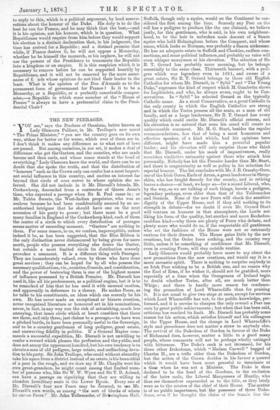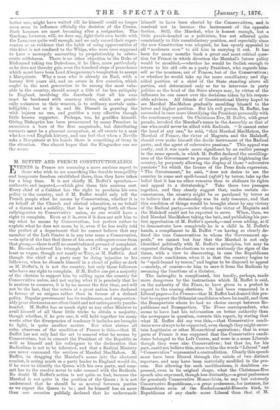THE NEW PEERAGES.
" rU see," says the Duchess of Omnium, better known as Lady Glencora Palliser, in Mr. Trollope's new novel " The Prime Minister," " you see the country goes on its own way, either for better or for worse, which ever of them are in. I don't think it makes any difference as to what sort of laws are passed. But among ourselves, in our set, it makes a deal of difference who get the Garters, and the counties, who are made barons and then earls, and whose name stands at the head of everything." Lady Glencora knew the world, and there can be no doubt that she spoke the truth, and that the distribution of "honours " such as the Crown only can confer has a most import- ant social influence in this country, and excites an interest far beyond that circle of nous autres to whose opinion she re- ferred. She did not include in it Mr. Disraeli's friends, Mr. Cockawhoop, descended from a contractor of Queen Anne's time, who expected a peerage when Sir R. Peel came in ; or Mr. Tubbe Sweete, the West-Indian proprietor, who was so zealous because he had been confidentially assured by an un- authorised intriguer that he should have one on the next accession of his party to power ; but there must be a good many families in England of the Cockawhoop kind, each of them the centre of a circle to which every distribution of peerages seems matter of exceeding moment. "Garters" are nothing to them. For some reason, to us, we confess, imperceptible, unless indeed it be, as has been suggested, that the Blue Ribbon is the only distinction never dishonoured by being given for mere merit, people who possess everything else desire the Garter, but outside a most limited circle its distribution scarcely provokes a comment. It is a different thing with Peerages. They are immoderately valued, even by those who have done great services ; they can be hoped for by all who possess the necessary qualifications, viz., counties, Consols, and consideration, and the power of bestowing them is one of the highest means of influence possessed by a British Premier. Mr. Disraeli has used it, like all his predecessors as a political engine, but it is to be remarked of him that he has used it with unusual caution, and apparently in deference to a theory. He makes Peers, as he talks to his constituents, on ideas which can scarcely be his own. He has never made an exceptional or bizarre creation, never recognised literature or honoured art in his nominations, never, in fact, in any way run the risk of astonishing, much less annoying, that inner circle which at heart considers that there are three, and only three, just claims to a peerage,—to have won a pitched battle, to have been personally useful to the Sovereign, and to be a country gentleman of long pedigree, great estate, and unswerving fidelity in politics. If a General Napier com- mands a successful expedition, Mr. Disraeli is not unwilling to confer a reward which pleases the profession and the public, and does not annoy the uppermost hundred, but his own tendency is to elevate a man of old pedigree, large estate, and unflinching devo- tion to his party. Sir John Trollope, who could without absurdity take his name from a district instead of an estate, ishis beau-ideal of a peer in the rough, and we dare say if Mr. Chaplin were his own great-grandson, he might count among that limited num- ber of persons who, Sir W. W. Wynn and Sir T. D. Acland, can have a peerage on signifying that they are willing to abandon hereditary seats in the Lower House. Every one of Mr. Disraeli's four new Peers may be &mated, to use Mr. Disraeli's own words, as among "the sort of blocks of whom he carves Peers." Mr. John Tollemache, of Heimingham Hall, Suffolk, though only a squire, would on the Continent be con- sidered the first among the four. Scarcely any Peer on the roll has a pedigree to produce like the one claimed, we believe justly, for this gentleman, who is said, in his own neighbour- hood, to be the heir in unbroken male descent of a Saxon squire who held Hehningham before the Conquest, and whose name, which looks so Norman, was probably a Saxon nickname. He has an adequate estate in Suffolk and Cheshire, endless con- nections, and some political influence, and probably no voice will even whisper annoyance at his elevation. The selection of Sir R. T. Gerard has probably more meaning, but he belongs essentially to the same class. Thirteenth baronet, with a pedi- gree which was legendary even in 1611, and owner of a great estate, Sir R. T. Gerard belongs to those old English Catholics for whom Mr. Disraeli, in " Sybil " and " The Young Duke," expresses the kind of respect which M. Gambetta shows for Legitimists, and who, he always avers, ought to be Con- servatives. In " Sybil " he selected Gerard as the typically Catholic name. As a stout Conservative, as a great Catholic in the only county in which the English Catholics are strong and in which the Tories possess all the seats, as a man of old family, and as a large landowner Sir R. T. Gerard has every quality which could excite Mr. Disraeli's official esteem, and his elevation is so natural that even his creed will create no unfavourable comment. Mr. H. G. Sturt, besides the regular recommendations, has that of being a most humorous and effective speaker, of a kind which, had his opinions been different, might have made him a powerful popular leader ; and his elevation will only surprise those who think that Mr. Disraeli, under his mask of impassiveness, really nourishes vindictive animosity against those who attack him personally. Nobody has hit the Premier harder than Mr. Sturt, and there is magnanimity as well as policy in his selection for especial honour. The list concludes with Mr. J. R. Ormsby-Gore, one of the Irish Gores, Earls of Arran, a great landowner in Shrop- shire, who has fought fiercely for the county, and in retiring leaves a chance—at least, we hope so—for a sound Liberal, who, by the way, as we are talking of such things, boasts a pedigree, legendary perhaps, even older than that of the Tollemaches and Gerardo. None of the new Peers will shock the sensitive dignity of the Upper House, and if they add nothing to its strength in debate—for we doubt if even Mr. Gerard Sturt will venture on humour in that atmosphere, the Lords not liking his form of the quality, but another and more Rochefou- cauldian kind—why there are plenty of Peers who debate, and plenty more who would do so, if the respectable old gentlemen who set the fashions of the House were not so extremely anxious for their dinners. The House gains little by the new creations, but the Order loses nothing, and the country very little, unless it be something of confidence that Mr. Disraeli, even in creating Peers, will step outside routine. Lady Glencora would probably have more to say about the new promotions than the new creations, and would say it in a more sarcastic spirit. There is nothing to surprise anybody in an Irish Peer wishing to be a British one, and no reason why the Earl of Erne, if he wishes it, should not be gratified, more especially at a time when the Orangemen of Ireland begin to doubt whether Tories, after all, are much better than Whigs ; and there is hardly more reason for condemn- ing the promotion of Lord Wharncliffe than for praising it. It is not usual to give two steps at once, except for services which Lord Wharncliffe has not, to the public knowledge, per- formed, and it is unwise to cheapen the only reward a Peer can earn by great public achievements ; but when that has been said, criticism has reached its limit. Mr. Disraeli has probably some reason for his action, which satisfies himself and his colleagues in the Upper House, and the change in Lord Wharncliffe's style and precedence does not matter a straw to anybody else. The revival of the Dukedom of Gordon in favour of the Duke of Richmond does, however, matter a little to a good many people, whose comments will not be perhaps wholly untinged with bitterness. The Duke's rank is not increased, for his three other Dukedoms, which " Madam Carwell " begged of Charles IL, are a trifle older than the Dukedom of Gordon, but the action of the Crown decides in his favour a quarrel which it would have been more graceful to terminate at a time when he was not a Minister. The Duke is thus declared to be the head of the Gordons, to the exclusion of the heirs male, the Liberal Marquesses of Huntly, who thus see themselves superseded as to the title, as they lately were as to the estates of the chief of their House. The matter is of no public importance, but the possessor of three Duke- doms, even if he thought the claim of the female line the 'better one, might have waited till he himself could no longer even seem to influence officially the decision of the Crown. Such honours are most becoming after a resignation. The Cordons, however, will, we dare say, fight their own battle with the Lennoxes quite well enough, and we only record their super- session as an evidence that the habit of using opportunities of this kind is not confined to the Whigs, who were once supposed to have a monopoly amounting to proprietorship in aristo- cratic selfishness. There is•no other objection to the Duke of Richutond taking ten Dukedoms, if he likes, more particularly as he does hot thereby gain even the hundred steps of precedence which must have been Lord Abergavenny's temptation to accept a Marquisate. Why a man who is already an Earl, with a barony 500 years old, and an estate in five counties, which ought in the next generation to be among the most valu- able in the country, should accept a title of far less antiquity in England, involving the drawback that all his sons must be burdened with courtesy titles, which are practi- cally nuisances to their wearers, is to ordinary mortals unin- telligible ; but so it is, and Mr. Disraeli in granting the -wish injures no one, and gratifies a very effective though little known supporter. Perhaps, too, he gratifies himself. Giving Bishoprics has been pronounced by many Premiers in succession a bore of the first magnitude, but distributing coronets must be a pleasant occupation, at all events to a man who has read English history, and can feel that when a Neville asks a Marquisate at his hands there is something of irony in the situation. One almost hopes that the Kingmaker can see the scene.











































 Previous page
Previous page